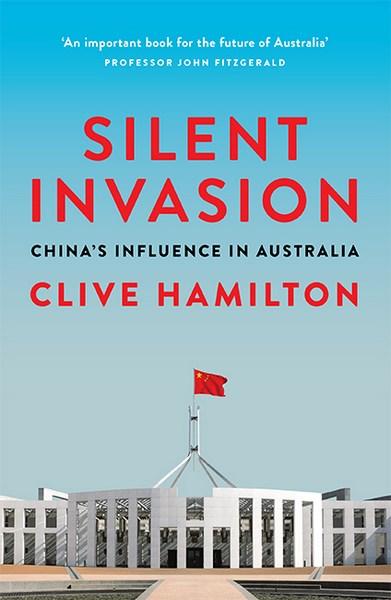Highly controversial, Silent Invasion: China’s Influence in Australia has a troubled history. Leading Australian publisher Allen & Unwin ditched the book in November, 2017, citing fear of legal action from the Chinese government or its proxies. The book was originally subtitled: How China Is Turning Australia into a Puppet State.
Speaking to The Sydney Morning Herald, author Clive Hamilton said: “I’m not aware of any other instance in Australian history where a foreign power has stopped publication of a book that criticises it. The reason they’ve decided not to publish this book is the very reason the book needs to be published.”
The book was only published after it was tendered as part of an Australian government inquiry into foreign interference. The SMH recorded: While such activity is carried out by other states, elements of Beijing’s influence campaign are clandestine or highly opaque. According to media investigations and warnings from spy agency ASIO, these efforts are targeted at Australian politicians and academics.
In an extract published in The Sydney Morning Herald Hamilton wrote:
The belief that “China is our destiny” is in fact an exaggeration created by business interests and people who make their living from China, amplified by the media. Like former ambassador and China buff Stephen FitzGerald, they believe “we are living in a Chinese world”. Our only sensible response is to gain a deeper understanding of China and learn how to engage it with more sensitivity and skill.
The latter is undoubtedly true; a greater understanding of China is the objective of this book. But it is a trap to believe that we now live in a Chinese world. We don’t. We live in a complex, multi-polar world. We will live in a Chinese world only if we choose to.
In 2008 Clive Hamilton was at Parliament House in Canberra when the Beijing Olympic torch relay passed through. He watched in bewilderment as a small pro-Tibet protest was overrun by thousands of angry Chinese students. Where did they come from? Why were they so aggressive? And what gave them the right to shut down others exercising their democratic right to protest? The authorities did nothing about it, and what he saw stayed with him.
In 2016 it was revealed that wealthy Chinese businessmen linked to the Chinese Communist Party had become the largest donors to both major political parties. Hamilton realised something big was happening, and decided to investigate the Chinese government’s influence in Australia. What he found shocked him.
From politics to culture, real estate to agriculture, universities to unions, and even in our primary schools, he uncovered compelling evidence of the Chinese Communist Party’s infiltration of Australia. Sophisticated influence operations target Australia’s elites, and parts of the large Chinese-Australian diaspora have been mobilised to buy access to politicians, limit academic freedom, intimidate critics, collect information for Chinese intelligence agencies, and protest in the streets against Australian government policy.
It’s no exaggeration to say the Chinese Communist Party and Australian democracy are on a collision course. The CCP is determined to win, while Australia looks the other way.
Thoroughly researched and powerfully argued, Silent Invasion is a sobering examination of the mounting threats to democratic freedoms Australians have for too long taken for granted. Yes, China is important to our economic prosperity; but, Hamilton asks, how much is our sovereignty as a nation worth?


